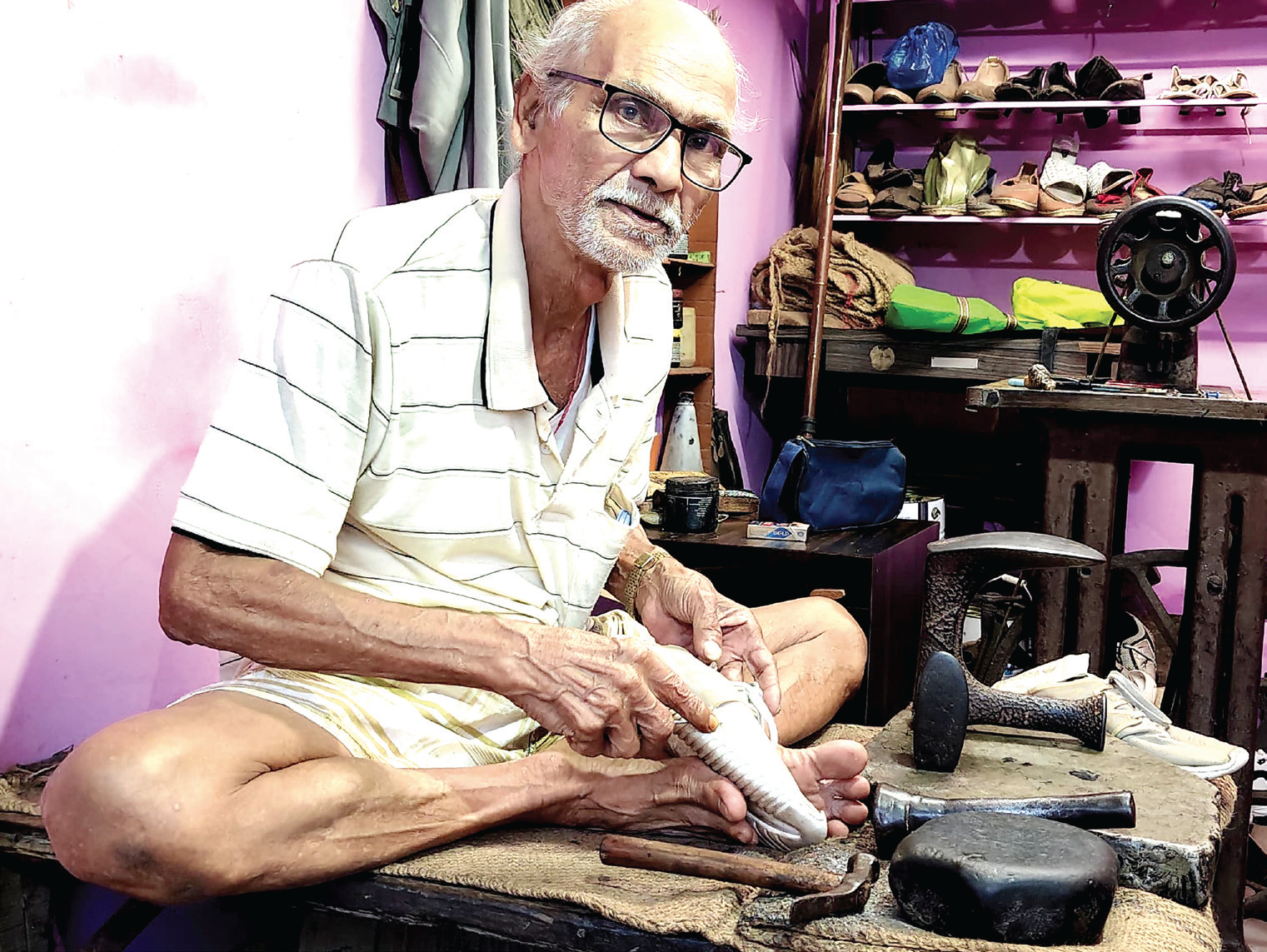

JENIFER FERNANDES
joseph@herald-goa.com
ALDONA: In the quiet village of Santarxette in Aldona, a man sits at his humble shop, working silently with his hands—hands that have shaped leather, stitched soles, and mended lives for over seven decades.
His name is Raghoba Sataderkar, 84 years old, and still going strong as
a cobbler.
“I never went to school beyond Class I,” says Raghoba with no trace of regret. “I lost my mother when I was just 9, and my father couldn’t feed us. So I was put to work—not by choice, but because I had to earn for the family.” But what began as a necessity turned into a passion. At just 13, he started learning the cobbler’s craft—not from formal teachers or books, but by watching others who were often unwilling to share their knowledge. “They wouldn’t teach me directly, but I observed everything they did. My interest helped me learn,” he recalls.
From making small shoes for children to mastering men’s formal footwear, Raghoba’s journey took him through Tivim, Margao, and even Kolhapur, where he picked up different techniques. “I learned to make sandals in Margao, and men’s shoes in Kolhapur. Then I returned to Goa and began my own small venture.”
That venture would eventually become his life’s foundation. He opened a shop in Aldona, got married, built his home with his own earnings, and raised a family. “I educated all my children. Today they are well settled. I may not have gone to school, but I made sure they did.”
What makes Raghoba truly inspirational isn’t just his skill—it’s his dedication, dignity, and determination. At 84, while many have long retired, he still opens his shop at 8.30 am, takes a break in the afternoon to buy fish and vegetables, returns at 3.30 pm, and wraps up by 6.30 pm. “Earlier I would work till 11.30 at night, making and supplying shoes to wholesalers. But with readymade shoes flooding the market, our business has faded.”
Despite that, he continues. Not because he must, but because he loves his work. “My family tells me to stop now. But this is what I’ve done all my life. How can I stop?” he says, smiling.
His work remains purely traditional—no machines, no shortcuts. “Everything I do is by hand. That’s how I learned, and that’s how I continue.” He understands different kinds of leather, recalls the days of using real animal hide (now banned), and explains how modern shoes are often made from resin and synthetic materials.
“People think this work is easy,” he says. “But you need to sit for long hours. It takes patience, strength, and love for the craft. My back hurts, but I’m used to it now.”
Raghoba is one of the last of his kind. Once, there were eight cobblers in Aldona. Today, he’s the only one left. “Even my children won’t take it up. They’ve seen the struggle. In the future, people may have to throw shoes away because no one will be left to repair them.”
But he doesn’t complain. He reflects. “I took care of cows once for just Rs 5 a month. I’ve stitched shoes, sandals, bags, chains—and even worked in the fields, from ploughing to harvesting. I never dreamed of a white-collar job. I was taught that if you learn a skill, you’ll never go hungry. That was enough.”
And it was. Through his craft, Raghoba built a home, raised a family, and lived with contentment. He credits his long life and fitness to the natural foods of his childhood— tizaan (ragi porridge), pezz (rice gruel or kanji), ghodshey and vonn (puddings made of lentils, coconut milk, palm jaggery) —and a life free of excess.
As the sun sets on the old cobbler’s day, he closes his shop, freshens up, watches a bit of TV, and rests. But his thoughts still linger on the future of his trade. “Goans don’t want to do this work anymore. Migrants will take over these traditional jobs. That’s the truth.”
And yet, with quiet pride and undying spirit, Raghoba declares, “As long as I am alive, I will do this work. If someone works hard and doesn’t feel ashamed, they can earn enough. You don’t have to go abroad or sit in an office to live a good life. I’m proof of that.”
What makes Raghoba truly inspirational isn’t just his skill—it’s his dedication, dignity, and determination. At 84, while many have long retired, he still opens his shop at 8.30 am, takes a break in the afternoon to buy fish and vegetables, returns at 3.30 pm, and wraps up by 6.30 pm. “Earlier I would work till 11.30 at night, making and supplying shoes to wholesalers. But with readymade shoes flooding the market, our business has faded.”